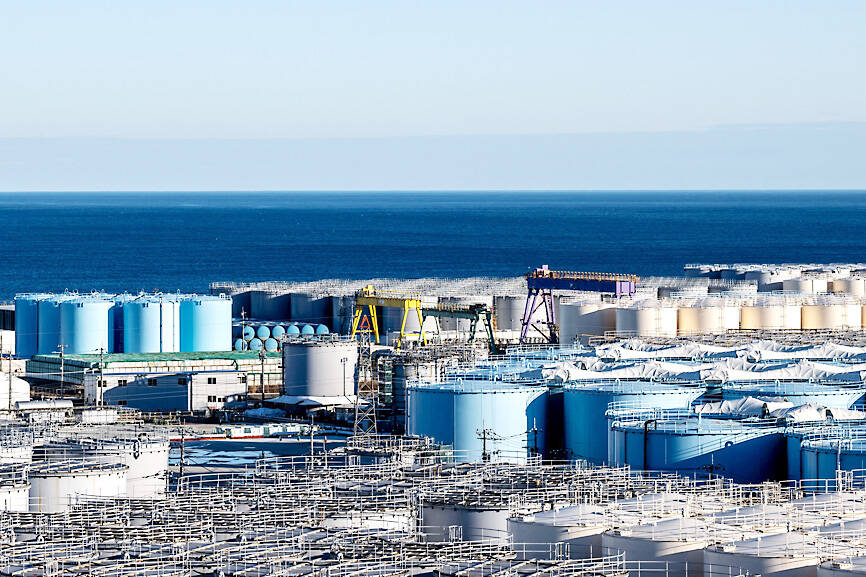The Atomic Energy Council (AEC) yesterday said that it would soon offer tritium concentration diffusion forecasts for sea water after Japan announced that starting tomorrow, it would discharge treated and diluted radioactive wastewater from the stricken Fukushima Dai-ichi Nuclear Power Plant into the Pacific Ocean.
Japanese Prime Minister Fumio Kishida gave the final go-ahead yesterday at a meeting of ministers involved in the plan and instructed the operator, Tokyo Electric Power Co, to be ready to start the coastal release tomorrow if weather and sea conditions permit.
Based on the nuclear plant’s design, the tritium-containing wastewater would first be filtered by an advanced liquid processing system and discharged through an undersea tunnel into waters about 1km off the coast, the council said.

Photo: AFP
The amount of tritium discharged into the ocean would be capped at 22 trillion becquerels per year — the cap set for the Fukushima plant when it was operating normally before the disaster in 2011.
The design of the nuclear wastewater discharge was reviewed and inspected by Japan’s Nuclear Regulatory Authority and meets the safety requirement for international nuclear power plants, the council said.
The government is to adopt several key measures in response to the move’s potential repercussions on the oceanic environment, the council said.
To study how the discharge of radioactive wastewater would affect waters around Taiwan, the council said in a statement that its Institute of Nuclear Energy Research has been working with the Central Weather Bureau to conduct diffusion simulation analyses on tritium concentration in the sea, based on 10 years of data collected after the Fukushima nuclear disaster in 2011.
The results showed that most of the wastewater flowed east toward the US west coast, the council said.
A small portion reached waters near Taiwan about one to two years after the discharge through a mesoscale eddy in the north Pacific Ocean, it said.
The tritium concentration is to reach maximum levels in about four years after the discharge starts, but it would still be far below normal background radiation levels, it said.
The discharge would have a “negligible impact” on the safety of waters near Taiwan,” it added.
“We will continue to conduct diffusion simulation analyses and begin to offer ocean tritium concentration diffusion forecasts after the discharge begins,” the council said.
The council added that it would work with the Ministry of Health and Welfare, the Ministry of Agriculture and the Ocean Affairs Council to regularly sample seawater and Taiwanese and Japanese seafood products to ensure that they meet food safety requirements.
The International Atomic Energy Agency on July 4 said that a joint investigation by 11 agency members showed that Japan’s nuclear wastewater discharge plan meets international safety standards and would have negligible effects on people and the environment, the council said.
Taiwanese experts also arrived at similar conclusions after conducting on-site inspections three times, it said.
“However, given that the nuclear wastewater discharge is to continue for more than 30 years, we will continue to monitor the operation and ask Japan to have an emergency response plan for any abnormality or emergency situation,” the council said.
Additional reporting by AP

MAKING WAVES: China’s maritime militia could become a nontraditional threat in war, clogging up shipping lanes to prevent US or Japanese intervention, a report said About 1,900 Chinese ships flying flags of convenience and fishing vessels that participated in China’s military exercises around Taiwan last month and in January have been listed for monitoring, Coast Guard Administration (CGA) Deputy Director-General Hsieh Ching-chin (謝慶欽) said yesterday. Following amendments to the Commercial Port Act (商港法) and the Law of Ships (船舶法) last month, the CGA can designate possible berthing areas or deny ports of call for vessels suspected of loitering around areas where undersea cables can be accessed, Oceans Affairs Council Minister Kuan Bi-ling (管碧玲) said. The list of suspected ships, originally 300, had risen to about 1,900 as

Japan’s strategic alliance with the US would collapse if Tokyo were to turn away from a conflict in Taiwan, Japanese Prime Minister Sanae Takaichi said yesterday, but distanced herself from previous comments that suggested a possible military response in such an event. Takaichi expressed her latest views on a nationally broadcast TV program late on Monday, where an opposition party leader criticized her for igniting tensions with China with the earlier remarks. Ties between Japan and China have sunk to the worst level in years after Takaichi said in November that a hypothetical Chinese attack on Taiwan could bring about a Japanese

Right-wing political scientist Laura Fernandez on Sunday won Costa Rica’s presidential election by a landslide, after promising to crack down on rising violence linked to the cocaine trade. Fernandez’s nearest rival, economist Alvaro Ramos, conceded defeat as results showed the ruling party far exceeding the threshold of 40 percent needed to avoid a runoff. With 94 percent of polling stations counted, the political heir of outgoing Costa Rican President Rodrigo Chaves had captured 48.3 percent of the vote compared with Ramos’ 33.4 percent, the Supreme Electoral Tribunal said. As soon as the first results were announced, members of Fernandez’s Sovereign People’s Party

MORE RESPONSIBILITY: Draftees would be expected to fight alongside professional soldiers, likely requiring the transformation of some training brigades into combat units The armed forces are to start incorporating new conscripts into combined arms brigades this year to enhance combat readiness, the Executive Yuan’s latest policy report said. The new policy would affect Taiwanese men entering the military for their compulsory service, which was extended to one year under reforms by then-president Tsai Ing-wen (蔡英文) in 2022. The conscripts would be trained to operate machine guns, uncrewed aerial vehicles, anti-tank guided missile launchers and Stinger air defense systems, the report said, adding that the basic training would be lengthened to eight weeks. After basic training, conscripts would be sorted into infantry battalions that would take